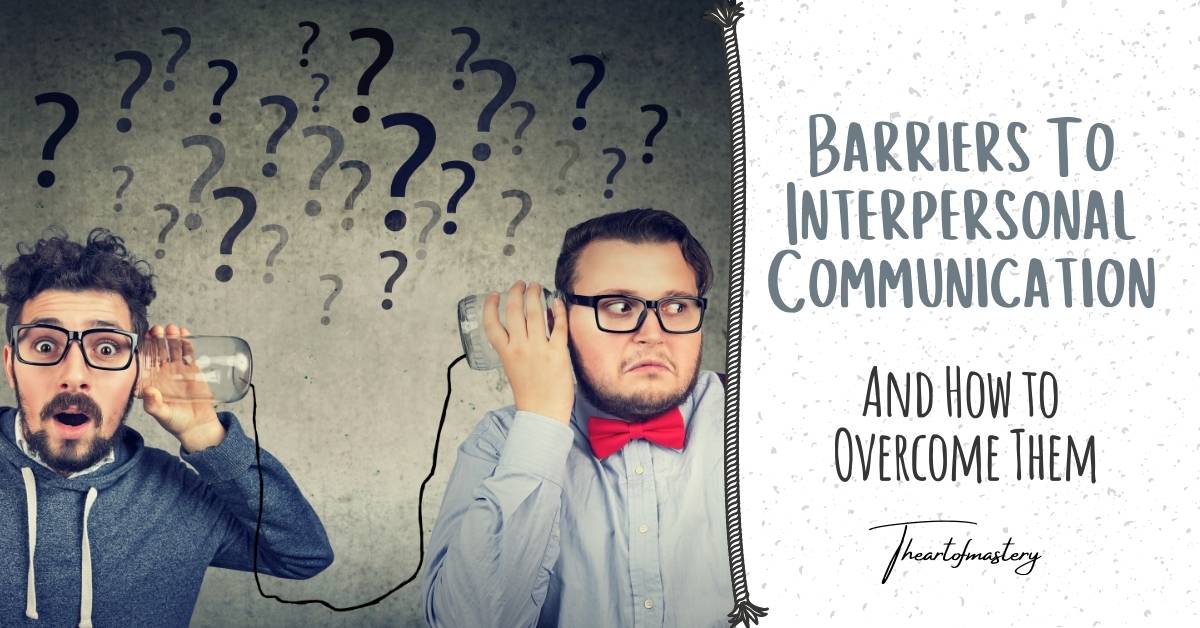Overcoming barriers to interpersonal communication is one of the hardest things to do. It requires a good balance between verbal communication and non-verbal communication. But, it is not an impossible feat.
If you want to know how to overcome barriers to interpersonal communication, then you are on the right track. Continue reading below for more valuable information.

Barriers to Interpersonal Communication
Interpersonal communication can be quite complicated due to several factors. As a result, these factors become barriers to interpersonal communication.
Language Differences
Language difference is one of the most common challenges. This is because communication is reliant on the non-verbal aspect of communication.
But, language difference does not only happen when two speakers have different languages. It can also occur when a particular speaker uses acronyms, jargon, and slang.
For example, a military staff member speaks to a friend and says, “It’s on your 2 o’clock.” The receiver has no military background. He or she then assumes that what the speaker meant is that they will meet around 2 o’clock for something. Instead of clarifying the message, the receiver assumed that their understanding is correct.
In the scenario mentioned above, both speakers are using the same language. But, it is still possible for the particular messages to be misunderstood.
Generational Difference

Another significant barrier to interpersonal communication is generational differences. The variations in priorities, values, and use of language can complicate the communication process. For example, in an office setting, the older generation may prefer face-to-face communication. But, the younger ones may prefer using other means of communication—for example, video and messaging apps.
The generational difference may also manifest in references used when communicating. Two speakers of different ages may not get the meaning of a particular reference. As a result, their wavelength is off-sync. When this happens, it takes more effort between them to get what each other means.
Cultural Difference
Interpersonal communication can be affected by misperception, stereotypical beliefs, poor cultural understanding. This is a common barrier. It’s because mistakes due to cultural differences are often made unconsciously. This is because many forget the fact that what might be acceptable to some may be rude to others.
An example of when cultural differences is a barrier is when you are working with nonnatives. You have to be extra careful with your mannerism and choice words to avoid conflict.
Personality Difference
An individual’s personality has a lot of influence on how they interact with others. Extroverts often have better interpersonal communication skills than introverts. They find it easier to speak out and share their ideas due to their personality.
Tips on How to Overcome Barriers to Interpersonal Communication
Use Simple Words
There is this idea that when you sound smart when using difficult-to-understand words. But, that is a wrong assumption. When you use jargon or slang, you make it difficult for others to understand you. This can cause a lot of conflicts later on. You might even feel frustrated because you will feel like others do not understand you.
The best solution to avoid misunderstanding is to use simple words. There is nothing wrong with doing this. You are making the communication process easier for you and the receiver. This is something that you should apply, whether you are speaking or writing.
Learn How to Listen

Listening is an important aspect of communication. But, it is often neglected because many people hear words rather than actually listen. Remember that listening requires you to be both attentive and proactive.
The highest form of listening is active listening. This involves listening using all your senses. You can start by learning how to maintain eye contact with the speaking person. This will help you catch the non-verbal cues that the speaker is combining with their words.
Conversely, doing this will show the speaker that you are listening to them. It will encourage them to continue relaying their message.
Learning how to listen does not happen overnight. It also requires some trial and error, so don’t worry if you do not get it right immediately. Give yourself some time and keep practicing.
Stay Calm when Communicating
High emotions, or the lack thereof, may affect the meaning of the message that you want to convey when communicating. This is why you should try to stay calm. Balance your emotions to lower the misunderstanding risks.
Besides, talking calmly is therapeutic. It also creates a good communication atmosphere for all the parties involved.
Ask for Clarifications
There will be times when you will not understand the meaning of a particular message. This is perfectly normal. When this happens, the best thing that you can do is to ask for clarification. This will ensure that both of you are on the same page.
When asking for clarification, ensure that you avoid interrupting while the speaker is still talking. Wait until they finish, and then raise your point of clarification. Always remember to be respectful and courteous when talking with others.
Ask for Feedback
Sometimes, it is difficult to improve something when you are only relying on your own opinion and judgment. This is why it is important to ask for constructive criticism from others.
This will help you identify the areas that you should focus on improving. At the same time, it can motivate you because you will also earn some appreciation if you are doing it well.
It is also good to provide feedback to others. But, make sure that it is solicited, but they might find it offensive if not.
Learn About Cultural Sensitivity
Dealing with different cultures can be quite tricky. But, it is unavoidable, because of globalization. Thus, cultural sensitivity is significant.
Cultural sensitivity requires being aware of cultural differences and similarities. It also involves avoiding biases. These biases can be in the form of what you think is right and wrong action. It can also be what are positive and negative values.
Learning about cultural sensitivity is now more important than ever. You start being sensitive by making an effort to learn about other cultures. Doing this will help you become sensitive and broaden your perspective of the world.
It’s also a good idea to take advantage of cultural diversity programs. These are often offered by companies or community programs. These are free and often provided by experts.
Be Open-minded
It’s difficult to talk to someone who does not recognize the ideas and opinions of other people. This is like talking to a brick wall which is important always to keep an open mind. It does not mean that you have to accept the ideas and opinions of others. But, you need to know where they are coming from.
Being open-minded will also help you learn how to deal with different personalities. Later on, it will also have a direct impact on your communication skills.
To learn how to be open-minded, you should be receptive to different ideas and arguments. There is nothing wrong with participating in healthy discourse. In fact, it can help you create new ideas and widen your perspective.
Final Words
Developing your interpersonal communication skills is indeed important. It will help not only the professional aspect of your life but also your day-to-day environment. Understanding the different barriers is the first step to improvement.
Don’t worry. Overcoming the barriers to interpersonal communication is challenging. But, the tips mentioned above will guide you.
Learn More
There is still a lot more to learn if you want to have better communication skills on top of the communication barriers that we are dealing with in certain situations. If you want to sharpen your communication skills, then the Communication Skills Training Series is exactly what you need!






